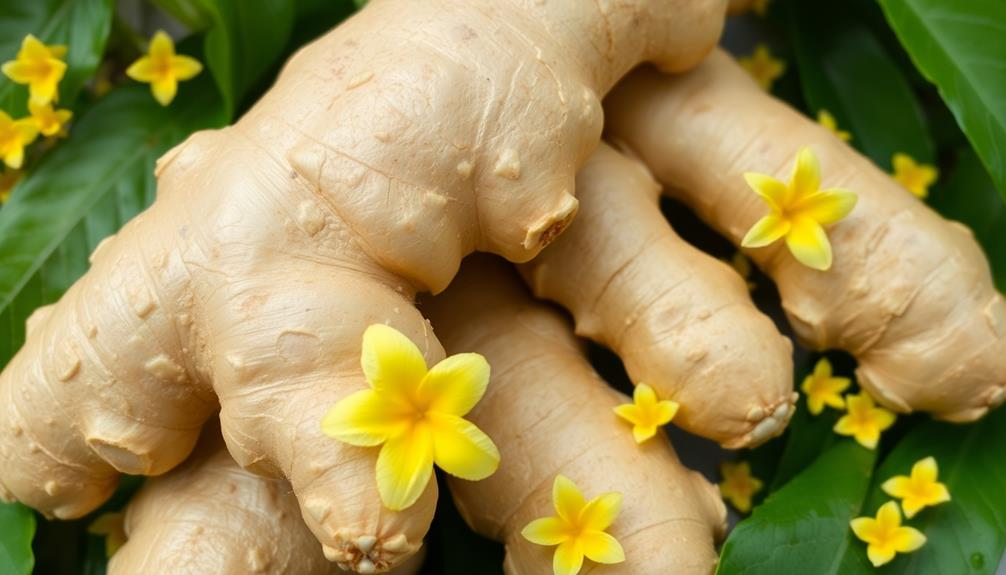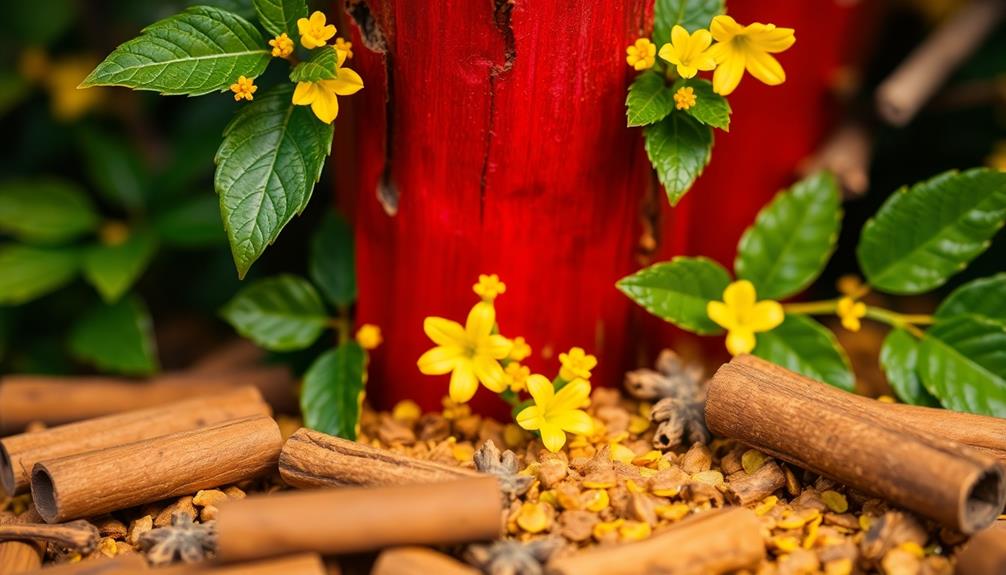Ginger smells sharp and invigorating, bursting with bright citrusy notes and a distinct peppery kick. When you smell fresh ginger, you might notice an earthy sweetness and even some subtle floral hints. It's a multi-layered scent that can energize and comfort. If you encounter dried or cooked ginger, the aroma warms and spices up, while maintaining its charm. You'll often find these delightful fragrances in bustling kitchens, cozy bakeries, or soothing spas. Overall, ginger's aroma is unique and captivating, inviting you to explore its many benefits and the feelings it can inspire.
Key Takeaways
- Fresh ginger emits a sharp, invigorating scent with bright citrusy notes and a distinct peppery kick from gingerol.
- Dried or cooked ginger offers warmer, spicier aromas, transforming the scent profile through chemical changes.
- The aroma has an earthy sweetness reminiscent of damp soil and sun-warmed stones, mixed with subtle floral hints.
- Ginger's complex fragrance creates a multi-layered olfactory experience that is both comforting and stimulating.
- It is often associated with warm, nostalgic feelings in baking and is used in aromatherapy to uplift mood.
Introduction

Ginger has captivated our senses for centuries with its sharp, invigorating scent. When you take a deep breath of ginger smell, you might notice its bright, citrusy notes that instantly awaken your senses. This fresh aroma is often described as zesty and uplifting.
But it doesn't stop there! As you inhale, you'll discover a distinct peppery kick, thanks to gingerol, the active compound that gives ginger its warm, spicy profile.
The ginger smell can transform based on what form you're encountering. Fresh ginger is bright and lively, while dried or cooked ginger brings out warmer, spicier aromas. This versatility allows ginger to blend beautifully with various fragrance notes, making it a popular choice in many perfumes.
You'll find that the aroma evolves, revealing earthy sweetness and even subtle floral hints, making each sniff a delightful experience.
Whether you're cooking, baking, or simply enjoying the fragrance, the ginger smell offers a multi-layered olfactory journey that's both comforting and stimulating.
Description of the Smell

How does the distinctive aroma of ginger affect your senses? When you catch a whiff of fresh ginger, you're greeted by a sharp and invigorating scent that's hard to ignore. Its citrusy notes leap out, providing a fresh, zesty kick that can instantly uplift your mood.
Along with this brightness, you'll notice a distinct peppery punch, thanks to gingerol, the active compound in ginger.
But there's more! The aroma also delivers a warm, earthy sweetness that reminds you of damp soil and sun-warmed stones. This combination creates a multi-layered olfactory experience that's truly unique. As you inhale deeper, subtle notes of spice and resin emerge, adding complexity to the scent profile. This intricate blend seamlessly complements agarwood’s distinctive fragrance profile, which is revered for its rich, woody depth and mysterious allure. Together, these elements evoke an atmosphere that feels both grounding and exotic, transporting you to a tranquil, faraway place.
You might even detect subtle floral hints that balance the sweet and savory aspects of ginger, adding to its complexity.
Source and Composition

The source of ginger's captivating aroma lies in its complex chemical composition, which includes various volatile compounds. When you take a whiff of ginger, you'll notice its sharp, invigorating scent. This aroma features citrusy notes and a distinct peppery kick from gingerol, the active compound responsible for this exciting fragrance.
As you inhale, the layers of ginger unfold, revealing warm, earthy sweetness that reminds you of damp soil, along with subtle floral hints. Fresh ginger offers a delightful mix of spicy, woody, and floral aromas that can brighten up any dish.
When you cook ginger, something magical happens. Gingerol transforms into zingerone, giving it a warmer and spicier scent than its fresh counterpart.
If you try dried ginger, you'll find it still holds onto the aromatic qualities of fresh ginger but with a twist. The dehydration process converts gingerol into shogaols, which are twice as potent, making the aroma even more pungent.
Typical Scenarios or Environments

Imagine walking into a bustling kitchen where fresh ginger is being chopped; its bright, citrusy aroma instantly fills the air, invigorating your senses. You might notice this scent while enjoying a delicious Asian dish, where ginger blends beautifully with other spices to enhance flavors.
In a cozy bakery, the warm smell of gingerbread wafts through the room, mixing sweet and spicy notes that create a nostalgic feeling.
Even in a spa, ginger's sharp yet refreshing scent is often used in aromatherapy. Here, it's believed to uplift your mood and help you relax.
At home, you can create a welcoming atmosphere with ginger candles. When blended with spices like cinnamon and clove, these candles fill your space with an earthy, sweet aroma that's perfect for fall and winter.
In perfumery, ginger takes center stage as a lively top or middle note in many fragrance blends. Its exotic scent profile adds warmth and energy, making it a popular choice for various perfumes.
Whether in the kitchen, a spa, or your home, the smell of ginger is sure to create a delightful and inviting environment.
Emotional or Cultural Associations

Ginger's aroma evokes warmth and comfort, often stirring up fond memories of baking and seasonal festivities. When you catch a whiff of ginger, it might remind you of delicious cookies or spiced cakes, especially during the holidays. Different types of ginger, like fresh, dried, or powdered, each have their own unique scents that can transport you to joyful moments spent with family and friends.
In many cultures, ginger isn't just a tasty ingredient; it also carries important meanings. For example, in Asian societies, its spicy scent often symbolizes prosperity and good health, especially during celebrations and rituals. You might find that during these special times, the smell of ginger enhances your feelings of happiness and connection.
Furthermore, ginger's invigorating aroma is used in aromatherapy to uplift your mood and help reduce stress. It connects you to emotional well-being and holistic health practices.
Health or Safety Considerations

When using ginger, it's important to be aware of certain health and safety considerations. While ginger is often enjoyed in dishes or as candied ginger, it can cause some side effects. For instance, ginger's active compound, gingerol, might irritate your skin. So, if you're using ginger-infused products, try a patch test first to avoid any issues.
Additionally, eating large amounts of ginger can lead to stomach troubles, like heartburn or nausea. If you have a sensitive stomach, be cautious.
Ginger can also interact with some medications, especially blood thinners, so check with your doctor before consuming a lot of it.
Pregnant women should limit their ginger intake, as high doses can cause complications. It's wise to talk with a healthcare provider if you're expecting.
Lastly, if you're allergic to other plants in the Zingiberaceae family, like turmeric or cardamom, be careful with ginger, too.
Always listen to your body and take note of any reactions. By being mindful of these health and safety considerations, you can enjoy ginger's benefits while staying safe.
Final Thoughts

Often, the aroma of ginger leaves a lasting impression that captivates the senses. When you encounter ginger, you'll notice its sharp, invigorating scent that has bright, citrusy notes mixed with a peppery kick. This unique smell comes from a compound called gingerol.
Fresh ginger offers a zesty profile, while cooked ginger transforms into a warmer, spicier aroma due to zingerone.
You might also find that dried ginger gives off a more concentrated scent. This is because it contains shogaols, which are twice as pungent as gingerol.
Ginger's aroma can change depending on how you use it, making it fun to explore in cooking or baking.
If you like fragrances, consider mixing ginger with other scents. This combination creates a complex and exotic fragrance profile that many people enjoy.
Frequently Asked Questions
Does Ginger Smell Nice?
You might find ginger's scent quite appealing. Its sharp, invigorating aroma combines citrusy notes with a warm sweetness, creating an uplifting experience that many enjoy. You'll likely appreciate its refreshing and complex fragrance.
Does Ginger Smell Like Lemon?
Ginger doesn't smell exactly like lemon, but you might notice some citrusy notes in its fresh aroma. It has a warm, spicy scent that can remind you of zesty fragrances, creating a lively experience. This vibrant scent profile makes ginger a popular choice in both culinary and aromatic applications, as it invigorates the senses with its unique blend of warmth and zest. While its fragrance may not be flowery, some people say it evokes a subtle complexity, slightly reminiscent of what lilac flowers smell like—delicate yet distinctive. This fusion of spicy warmth and faint floral undertones adds depth to ginger’s already intriguing essence.
Is Ginger a Masculine Scent?
You might think of ginger as a masculine scent, but its warm, spicy notes appeal to everyone. Its versatility allows it to enhance both men's and women's fragrances, making it a popular choice for all.
What Is the Pungent Smell of Ginger?
When you encounter ginger's pungent smell, you'll notice its sharp, invigorating aroma. Fresh ginger combines bright citrus notes with earthy undertones, while cooked ginger offers a warmer, less intense scent. It's truly captivating!









